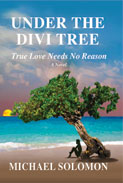
 |
Love's ability to transcend the most difficult of circumstances and persist is best exemplified by this heartwarming story of Matthew and Carol Crane. While the story opens up with Matthew on a flight to Aruba, his sixteenth trip there, the entire story is narrated as a flashback to another passenger who happens to be a clinical psychologist. The Cranes' love story is decidedly central to the novel's progression. However, when Matthew falls into a seemingly unbreakable slumber, the exploration of the scientific and metaphysical is equally intriguing.
The first sparks of the Cranes' romance were born out of playful banter. From Carol being upset that Matthew had the audacity to bring an outsider to their college dance to begrudgingly dancing with him despite believing he wasn't her type, Matthew and Carol's love story is magnified by the monumental decision Carol makes to prevent Matthew from being drafted for the Vietnam War. Subsequently, a theme that permeates throughout is how easily life and normalcy can be stripped away by something as minuscule as a bee sting following a round of golf with a friend just as you embark upon retirement. Such is the misfortune of Matthew, whose inconceivable stupor despite having perfectly normal scans and preliminary tests stumps medical experts, including family friend Dr. Stuart Leese.
From an execution perspective, the narrative is undoubtedly character-driven and flows seamlessly, propelled by an abundance of shorter, descriptive paragraphs, energetic dialogue, and vivid imagery. More importantly, in the process of deciphering Matthew's condition, the scientific discussion between doctors regarding the pineal gland could have easily taken a turn down dense, technical shrubbery. Instead, the process of understanding the pineal gland and the power of the third eye is not only demystified but depicted with such clarity and precision that it would be clear and intriguing to the layman.
After drawing blanks for some time, Matthew's medical team uses a spinal tap to unearth an inordinately high level of melatonin. The introduction of Dr. Gupte Shah, a prominent Mumbai doctor, adds another dimension of spirituality and philosophy through the understanding of the pineal gland, its role as one's inner vision, and its portrayal among numerous cultures. With Matthew's consciousness experiencing its own version of float therapy, complete darkness and sensory deprivation force him to wonder whether he is even alive despite existing in complete peace. At the same time, as Matthew approaches a state of Nirvana, Dr. Gupte and Dr. Leese are collaborating to fully understand this medical anomaly and win a race against time to help Matthew wake up.
An entire segment is dedicated to unraveling what the third eye or pineal gland could mean and how it interacts with the hypothalamus. With one of its functions predicated upon controlling the body's biorhythms, the pineal gland holds the key to unlocking the mystery of how Matthew's biological clock has come to a screeching halt. He has perfectly stable vitals but no growth of nails or hair over time. Interestingly, the divi tree from the title is seemingly a representation of one's love compass. It continually withstands the blowing of life's winds, focusing on itself and growing branch after branch to make the divi tree itself stronger.
Perhaps the most refreshing aspect of the novel is the role reversal between the main characters. Though Matthew is the decorated former police detective turned entrepreneur, Carol goes into full-on detective mode to understand the role of the mind, dreams, and the overall subconscious in her unyielding devotion to her husband. Overall, the narrative paints the greatest of "what-if" questions, asking readers to conjure how they would react if time would freeze for an extended period only for them while the world and relationships continue to move forward and evolve. Solomon's narrative is unique in its ability to take an age-old mantra of love being tested and presenting it through the lens of medical phenomena.